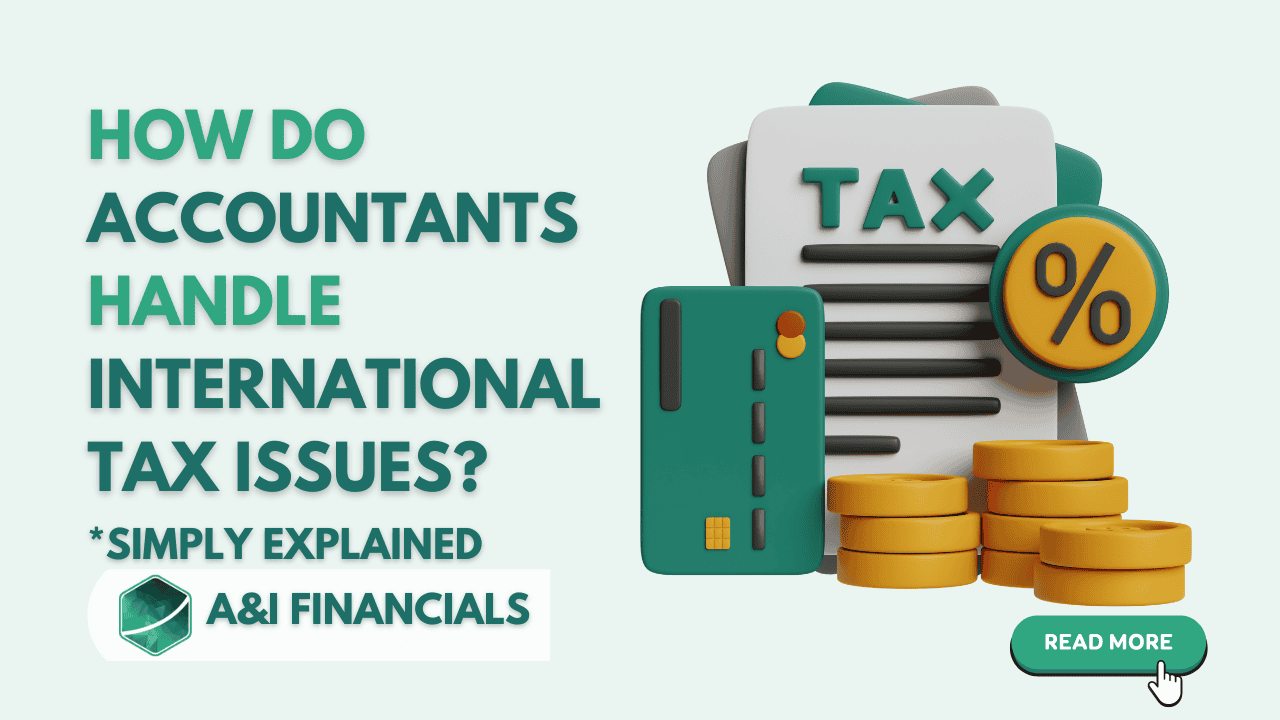How Do Accountants Handle International Tax Issues? Simply Explained
Tackling international tax issues can be very challenging. Trust me; I’ve seen it up close. As accountants juggle cross-border tax obligations, they don’t just crunch numbers; they dive deep into the tax systems of multiple countries to ensure their clients pay taxes correctly and efficiently. You might think it’s as simple as plugging numbers into a formula, but it’s more like solving a giant jigsaw puzzle where each piece represents a different country’s tax law.
The World of International Taxation
International tax planning is not just about understanding numbers; it’s about grasping the laws, regulations, and intricacies of various countries. Imagine it as a chess game where each move must be carefully calculated to avoid checkmate. One wrong move, and your client might face hefty fines or even legal trouble.
The Importance of International Tax Planning
Here’s why international tax planning is crucial: it’s all about minimizing tax liability while staying compliant with international tax laws. It’s like finding the right balance on a seesaw. Too much weight on one side, and you could face severe consequences.
Why is this important?
- Save Money: Proper planning helps businesses pay taxes efficiently, reducing overall costs.
- Stay Compliant: Ensures that all tax obligations are met, avoiding legal troubles.
- Optimize Business Operations: Helps international businesses operate smoothly across borders.
The Challenges of Handling International Tax Issues
Handling international tax issues can feel like navigating a maze blindfolded. Each country has its unique tax system, and tax professionals need to know them inside and out. It’s like learning a new language for each country you do business in.
Some challenges include:
- Diverse Tax Laws: Different countries have different rules and regulations.
- Tax Treaties: Understanding agreements between countries to prevent double taxation.
- Transfer Pricing: Setting prices for transactions between related entities in different countries.
Diverse Tax Laws
Imagine trying to play soccer in a country where the rules are entirely different. That’s what it’s like dealing with various tax laws. Each country has its tax system, and accountants must adapt to each one. It’s not just about knowing the rules; it’s about understanding the culture and context behind them.
Tax Treaties
Tax treaties are agreements between countries to avoid taxing the same income twice. Think of it as a bridge between two nations, ensuring smooth travel for tax purposes. Without these treaties, businesses could end up paying taxes twice on the same income, like being charged twice for a meal you ordered once.
Transfer Pricing
Transfer pricing is like setting the rules for trading baseball cards between friends. You want to make sure everyone gets a fair deal, especially when the friends are companies in different countries. It ensures that transactions between related entities are priced fairly and comply with international regulations.
Practical Steps Accountants Take
So, how do accountants handle international tax issues? It’s a blend of art and science, and here’s how they do it:
Understanding Tax Residency
One of the first things accountants need to do is determine tax residency. It’s like figuring out which team a player belongs to in a game. Tax residents are subject to the tax laws of a specific country, and understanding this helps in assessing tax obligations.
- Who is a tax resident?: A tax resident is someone who spends a significant amount of time in a country or has vital ties there. Knowing this helps accountants identify which tax laws apply.
Evaluating Tax Implications
Every business decision has tax implications. It’s like choosing a route on a road trip; each path has different consequences. Accountants assess these implications to ensure compliance and efficiency.
- Impact on Business: How will taxes affect profits and operations?
- Cost-Benefit Analysis: Weighing the pros and cons of different strategies.
Leveraging Tax Treaties
Tax treaties are a powerful tool for international business. They’re like peace treaties, ensuring that businesses aren’t taxed twice for the same income. Accountants use these treaties to minimize tax liability and optimize operations.
- Avoiding Double Taxation: Ensures that income isn’t taxed in two countries.
- Enhancing Efficiency: Streamlines international operations.
Navigating Reporting Requirements
Different countries have different reporting requirements. It’s like following a recipe; missing a step can lead to disaster. Accountants ensure that all necessary documents are filed accurately and on time.
- Compliance: Ensures that all legal obligations are met.
- Accuracy: Prevents costly mistakes and penalties.
Analyzing Transfer Pricing
Transfer pricing requires careful analysis and documentation. It’s like setting the price for a rare collectible; it needs to be just right. Accountants ensure that all transactions between related entities are priced fairly and comply with international standards.
- Documentation: Keeping records of all transactions.
- Fair Pricing: Ensuring that prices reflect market conditions.
Real-Life Examples of International Tax Issues
Let’s look at some real-life examples to illustrate how accountants handle international tax issues. These stories show the complexities and nuances of international taxation.
Example 1: The Case of Global Intangible Low-Taxed Income (GILTI)
GILTI is a tax on foreign income from intangible assets, like patents and trademarks. It’s like a tax on the hidden treasures of international business. Accountants must navigate this tax to avoid unexpected liabilities.
- Challenge: Understanding the impact of GILTI on international operations.
- Solution: Implementing strategies to minimize tax liability.
Example 2: Cross-Border Real Estate Investments
Investing in real estate across borders can be a tax nightmare. It’s like buying property on a Monopoly board, with each square representing a different country’s tax laws. Accountants must understand these laws to optimize investments.
- Challenge: Navigating diverse tax regulations for real estate investments.
- Solution: Leveraging tax treaties and planning strategies to reduce costs.
Example 3: United States Tax Obligations for International Business
The United States has specific tax obligations for international businesses, like a strict referee ensuring fair play. Accountants must understand these obligations to avoid penalties and optimize operations.
- Challenge: Complying with U.S. tax laws for international operations.
- Solution: Implementing robust compliance strategies and leveraging tax treaties.
Key Strategies for Handling International Tax Issues
Handling international tax issues requires a blend of expertise, strategy, and innovation. Here are some key strategies accountants use:
Collaborating with Tax Professionals
Collaboration is key in international taxation. It’s like forming a dream team, with each member bringing unique skills to the table. Tax professionals work together to ensure comprehensive and efficient solutions.
- Teamwork: Collaborating with experts in various fields.
- Expertise: Leveraging specialized knowledge and skills.
Staying Updated with Tax Laws
Tax laws are constantly changing, and staying updated is crucial. It’s like keeping up with the latest trends in fashion; what was in style yesterday might not be today. Accountants stay informed to ensure compliance and efficiency.
- Continuous Learning: Keeping up with changes in tax regulations.
- Proactive Planning: Anticipating changes and adapting strategies.
Utilizing Technology
Technology plays a vital role in international taxation. It’s like having a high-tech toolbox with advanced gadgets and tools. Accountants use technology to streamline processes and enhance accuracy.
- Automation: Reducing manual tasks and increasing efficiency.
- Data Analysis: Leveraging technology to analyze complex data.
Implementing Transfer Pricing Strategies
Transfer pricing strategies are essential for international business. It’s like setting the rules for fair play in a game. Accountants implement these strategies to ensure compliance and optimize operations.
- Pricing Analysis: Ensuring fair pricing for cross-border transactions.
- Documentation: Keeping detailed records to support pricing decisions.
Practical Tips for Businesses and Accountants
For those venturing into international business or handling international tax issues, here are some practical tips:
Understand Your Tax Obligations
Knowing your tax obligations is essential. It’s like reading the rulebook before playing a game. Understanding these obligations helps businesses stay compliant and avoid penalties.
- Research: Understand the tax laws and regulations in each country.
- Seek Professional Advice: Consult with tax professionals for guidance.
Leverage Technology
Utilize technology to streamline tax processes. It’s like having a GPS for navigation; it helps guide you through complex terrain.
- Automation Tools: Use software to automate repetitive tasks.
- Data Analysis: Leverage technology to analyze data and identify trends.
Collaborate with Experts
Collaboration is key in international taxation. It’s like forming a team of experts, each with unique skills and insights. Working together ensures comprehensive solutions.
- Networking: Build relationships with other tax professionals.
- Teamwork: Collaborate to develop effective strategies.
Stay Informed
Stay updated with changes in tax laws and regulations. It’s like keeping up with the latest news; staying informed helps you anticipate changes and adapt strategies.
- Continuous Learning: Attend seminars and workshops to stay informed.
- Proactive Planning: Anticipate changes and develop strategies to adapt.
Embrace Global Opportunities
Embrace the opportunities that international business presents. It’s like exploring a new world, full of potential and possibilities.
- Expand Horizons: Explore new markets and opportunities.
- Innovate: Develop creative solutions to complex challenges.
How Do Accountants Of A&I Financials Handle International Tax Issues?
At A&I Financials, our expert accountants simplify interna tional tax issues with precision and dedication. We leverage our deep understanding of global tax regulations to tailor solutions that minimize liabilities and ensure compliance across borders. By employing advanced tax planning strategies, we help businesses navigate complex cross-border transactions, optimize tax positions, and avoid costly penalties. Trust our team to guide you through the international tax landscape, turning challenges into opportunities for growth.
Conclusion: The Journey of International Taxation
International tax issues present a thrilling journey filled with challenges and opportunities, like setting sail into uncharted waters where each wave presents a unique challenge. Accountants are the seasoned navigators, deftly guiding businesses through this intricate landscape.
So, how do accountants handle international tax issues? They meticulously analyze tax laws, leverage international treaties, and collaborate with global partners to minimize liabilities and ensure compliance. For business owners and accountants alike, embracing these opportunities, staying informed, and harnessing the power of collaboration and technology are essential to thrive in this global environment. The world of international taxation is waiting. Are you ready to embark on this adventure with A&I Financials?






